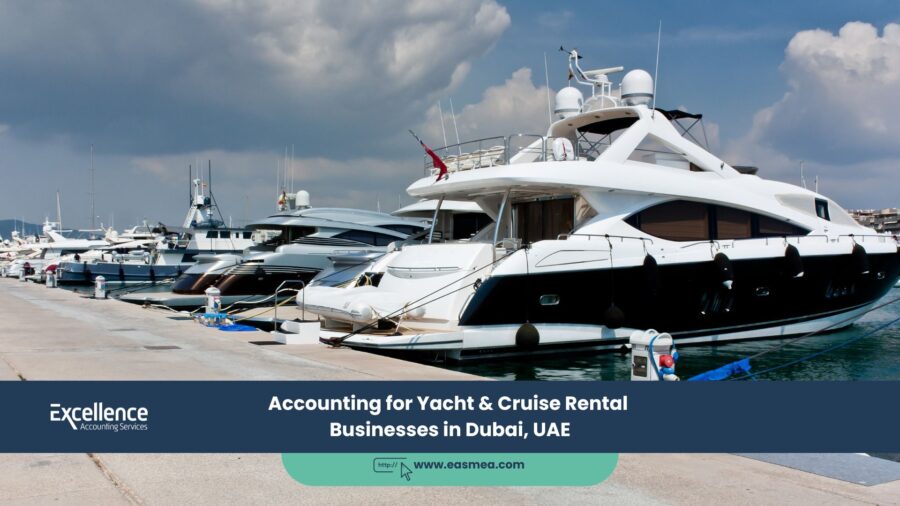Dubai’s stunning coastline and world-class marinas make it a global destination for luxury yachting and marine leisure. For the yacht and cruise rental companies that provide these exclusive experiences, the business is a glamorous blend of high-end hospitality and complex marine operations. While the focus is on delivering a flawless luxury experience, the long-term success of a charter business is anchored in disciplined, precise, and strategic financial management.
Accounting for a yacht rental business in Dubai is a highly specialized field. It involves managing multi-million-dirham assets, accurately costing each individual charter, and navigating a sea of operational costs from fuel and crew to maintenance and berthing fees. Without a robust accounting framework to chart these financial waters, even a busy charter company can find itself adrift, with profits lost to unforeseen costs and inefficient operations.
This definitive guide provides a strategic blueprint for Accounting for Yacht & Cruise Rental Businesses in Dubai, UAE. We will explore the critical financial practices for this niche sector, from the correct revenue recognition for charters to the meticulous tracking of vessel maintenance costs and crew payroll. We will also provide clarity on the application of VAT and the new UAE Corporate Tax to marine leisure services, ensuring your business sails smoothly through its compliance obligations.
Whether you operate a single luxury yacht or a diverse fleet of charter vessels, this guide will equip you with the financial knowledge to manage your business with precision. We will cover industry best practices, essential financial controls, and the reporting that builds confidence with yacht owners, charter clients, and regulatory authorities.
Key Takeaways
- Charter-Based Costing is Essential: Profitability is determined on a per-charter basis. You must accurately track all direct costs for each trip, including fuel, crew, catering, and any port fees.
- Vessel Costs are a Major Expense: Meticulously tracking the total cost of ownership for each yacht—including depreciation, insurance, berthing, and major maintenance—is critical for financial planning.
- Revenue Recognition for Charters: Revenue from a charter should only be recognized when the trip is completed. Advance payments and deposits must be treated as a liability (“Deferred Revenue”).
- Manage Crew Payroll and Commissions: A clear system is needed to manage payments to both salaried and freelance crew, including any commissions paid to charter brokers.
- VAT and Corporate Tax Compliance: Understanding how VAT applies to local and international charters, and how the 9% Corporate Tax affects your profits, is a legal and financial necessity.
The Financial Anatomy of a Yacht Charter Business
A yacht charter business is a capital-intensive, luxury service operation. The business model is built on maximizing the utilization of very high-value assets (the yachts) while delivering an exceptional hospitality experience. The financial structure is dominated by high fixed costs of ownership and significant variable costs for each charter. Success depends on a strong sales and marketing effort to secure bookings and flawless operational execution to control costs.
Operating in Dubai means all marine craft and operations are licensed and regulated by the Dubai Maritime Authority. As the primary regulator, their rules, which can be found on their official website, govern safety, licensing, and operational standards. The costs associated with meeting these stringent compliance requirements are a fundamental part of your business model.
Core Principles of Accounting for Yacht & Cruise Rental Businesses in Dubai, UAE
The fundamental principle of accounting for yacht & cruise rental businesses in Dubai, UAE, is the ability to isolate and analyze the profitability of every single charter. In a business with such high operating costs, a single unprofitable trip can significantly impact your bottom line. A robust job costing system, tailored to marine operations, is the only way to maintain financial control.
The Foundation: Costing Every Charter
You cannot set a profitable charter price if you do not know exactly what it costs to operate the yacht for that specific trip. A trip cost sheet must be created for every single charter. This sheet accumulates all the direct, variable costs associated with that voyage.
The essential costs to track for each charter are:
- Fuel: The single largest variable cost for any trip.
- Crew Costs: The wages of the captain and crew for the duration of the charter, or the fixed fee for freelance crew.
- Provisions & Catering: The cost of all food, beverages, and other supplies for the guests.
- Port & Cruising Fees: Any fees for leaving the marina, permits for specific cruising areas, or other port charges.
- Commissions: Fees paid to charter brokers or booking platforms for securing the charter.
In yachting, the charter fee pays for the luxury, but the cost sheet determines the profit. Knowing the cost of every nautical mile is paramount.
By subtracting these total trip costs from the charter revenue, you calculate the “contribution margin” of the trip. This is the amount that is left over to contribute towards covering the yacht’s massive fixed costs (depreciation, insurance, berthing). A professional bookkeeping service is essential for setting up this detailed cost tracking.
A Closer Look at Accounting for Yacht & Cruise Rental Businesses in Dubai, UAE
Profitability in the luxury charter market is a function of premium service delivery and airtight financial control. This requires a detailed approach to managing your revenue cycle and your most valuable assets: your vessels and your crew.
Charter Revenue Recognition
The accounting for charter revenue must follow the accrual principle. When a client pays a deposit or the full charter fee in advance, this cash should be recorded on your balance sheet as a liability under “Deferred Revenue” or “Unearned Charter Fees.” You only “earn” the revenue when you have fulfilled your service obligation—that is, when the charter has been successfully completed. At that point, you make an accounting entry to move the fee from the deferred revenue liability to the “Charter Revenue” account on your income statement. This ensures your financial statements accurately reflect your performance in each period.
| Financial Item | Description | Accounting Treatment |
|---|---|---|
| Charter Fee Deposit | An advance payment from a client to secure a booking. | Recorded as a Deferred Revenue liability until the charter is complete. |
| Fuel Cost | The cost of fuel consumed during a specific charter. | A direct cost allocated to that specific charter’s cost sheet. |
| Yacht Depreciation | The annual allocation of the yacht’s purchase price. | A fixed operating expense, part of the yacht’s total cost of ownership. |
| Crew Salaries | Monthly salaries for full-time captain and crew. | A fixed operating expense (payroll). A portion can be allocated to charters for costing. |
Managing Crew Payroll
Your crew is essential to the luxury experience. You may have full-time, salaried crew on your payroll, or you may hire freelance crew for specific charters. Your accounting system must handle both. For salaried crew, you must manage a compliant payroll system, adhering to the UAE’s Wages Protection System (WPS) and accounting for end-of-service gratuity. For freelance crew, you should have clear contracts and they should provide you with proper invoices for their services. The cost of freelance crew is a direct cost of the charter they work on.
Navigating Tax and Compliance in Dubai
A professional yacht charter company in Dubai must be fully compliant with the UAE’s tax regulations. For the most authoritative guidance, you should always refer to the official website of the Federal Tax Authority (FTA).
VAT on Yacht Charters
The VAT treatment of a yacht charter depends on where the service takes place.
- Local Charters: A charter that takes place entirely within UAE territorial waters is a standard-rated supply and is subject to 5% VAT.
- International Charters: The supply of international transport of passengers is zero-rated for VAT. If a charter involves transporting passengers from the UAE to a location outside the UAE (e.g., a trip to Oman), the service may qualify for the zero rate. This requires meticulous documentation, including voyage logs and clearance papers, to prove the nature of the trip.
A meticulous system for VAT accounting is crucial to apply these rules correctly.
Corporate Tax for Charter Businesses
Your charter company will be subject to the 9% UAE Corporate Tax on its annual taxable profits exceeding AED 375,000. Your taxable profit is your total revenue minus your deductible operating expenses. The accuracy of your cost tracking, particularly for vessel depreciation and maintenance, will have a direct impact on your tax liability. Maintaining complete records for every transaction is mandatory. Professional corporate tax services are vital for ensuring compliance.
What Excellence Accounting Services Can Offer
At Excellence Accounting Services (EAS), we have expertise in the capital-intensive hospitality and transport sectors. We understand the unique financial challenges of the yacht charter industry, from managing high-value assets to the complexities of trip costing. We offer specialized accounting services to provide the financial control and strategic insight your business needs.
Our specialized offerings for yacht and cruise rental businesses include:
- Charter Costing and Profitability Analysis: We help you implement systems to track the direct costs of every charter, giving you clear insights into your contribution margins.
- Fixed Asset and Depreciation Management: We manage the accounting for your high-value vessels, including calculating depreciation and advising on the capitalization of major refits.
- Revenue Recognition and Crew Payroll: We ensure your charter revenue is recognized correctly and can manage your complex payroll needs for both salaried and freelance crew.
- VAT and Corporate Tax Compliance: Our tax experts will manage all your FTA filings, ensuring you are fully compliant with the specific rules for the marine leisure industry.
- Virtual CFO Services: Get high-level strategic guidance on charter pricing, cash flow management, and asset replacement strategy. For more details, see our Virtual CFO services.
By partnering with EAS, you gain a financial team that can help you navigate to success. We handle the financial complexity so you can focus on delivering an unparalleled luxury experience.
Frequently Asked Questions (FAQs)
A major overhaul that extends the life or improves the performance of the yacht’s engines is a capital expenditure. Its cost should be capitalized—added to the book value of the yacht on your balance sheet—and then depreciated over the estimated period until the next major overhaul is due. It is not a simple repair expense to be written off in one year. This correctly matches the significant cost over the period it provides a benefit.
No. When you receive the deposit, the cash is recorded in your bank, but you must also record a corresponding liability on your balance sheet called “Deferred Revenue” or “Charter Deposits.” You only earn the revenue when the charter is complete. Once the trip is over, you would then make an accounting entry to move the full charter fee from the deferred revenue liability to your “Charter Revenue” account on the income statement.
A security deposit is not revenue. It is the client’s money that you are holding in trust. It should be recorded as a liability on your balance sheet in a separate account like “Client Security Deposits.” After the charter is completed and you have confirmed there are no damages to the yacht, you refund the deposit in full, and the liability is removed. If you have to use part of the deposit to pay for a repair, that amount is used to cover the repair expense, and only the remainder is refunded.
Their basic monthly salaries are a fixed operating expense of the business. However, for the purpose of costing a specific charter to determine its profitability, you should allocate a portion of their salary cost to that trip. This can be done by calculating a daily or hourly cost for the crew and applying it to the duration of the charter. Any specific trip bonuses or overtime paid would be a direct cost of that charter.
The commission paid to a broker is a direct cost of that specific sale. It should be recorded as a “Commission Expense” and, for analysis purposes, should be deducted from the charter revenue to determine the net revenue from that booking. It is a key variable cost that must be factored into your profitability calculation for every charter sourced through a broker.
This is a major strategic decision. Owning your own yachts (the “charter operator” model) offers the potential for higher profits as you keep 100% of the charter revenue. However, it involves immense capital investment and financial risk. Managing yachts for private owners (the “charter management” model) is less capital-intensive and has lower risk, as the owner bears the costs of the yacht. Your income is a smaller but more stable management fee plus a share of any charter revenue. Many companies use a hybrid model.
Yes. If the food and beverages are supplied by you as part of the overall charter package, they are considered part of a single composite supply of a luxury charter service. The entire fee for the charter, including the value of the F&B, is subject to 5% VAT (if it’s a local charter).
A very common reason is underestimating the total cost of ownership of the yacht. Owners often focus on the charter revenue but fail to properly budget for and cost the huge, ongoing expenses of maintenance, berthing, insurance, and crew. A single major, unexpected engine repair can wipe out the profits of an entire season if it has not been properly provided for. Meticulous budgeting and cost tracking are essential.
Your historical cost data is the foundation of your pricing strategy. By accurately costing every charter you run, you know your break-even point. You know exactly how much you need to earn from a day’s charter just to cover your variable costs and contribute a certain amount to your fixed costs. This data allows you to set your public charter rates with confidence and know exactly how low you can go when negotiating a last-minute deal without losing money.
An independent audit provides a high level of credibility. If you are seeking financing from a bank to purchase a new yacht, they will demand professionally audited financial statements. If you are in the business of managing multi-million-dirham yachts for high-net-worth owners, an audit provides them with independent assurance that their asset and the associated finances are being managed with the highest degree of professionalism and integrity.
Conclusion: Charting a Course for Profitability
The yacht charter industry in Dubai offers a world of luxury and unparalleled experiences. The success of the companies that provide these services is a testament to their commitment to quality, safety, and exceptional hospitality. However, the financial success of the voyage is determined long before the yacht leaves the marina, in the detailed and disciplined world of accounting.
By mastering the art of charter costing, diligently managing your high-value assets, and navigating the UAE’s regulatory and tax waters with expertise, you build a business that is as stable and seaworthy as the vessels you operate. This financial clarity empowers you to price your charters for profit, manage your fleet efficiently, and build a lasting reputation for excellence in a glamorous and demanding industry.
From Marina to Margin.
Let Excellence Accounting Services provide the specialized financial management and industry insight your yacht rental company needs to thrive in Dubai.




